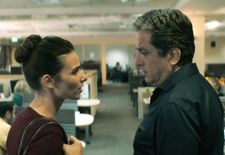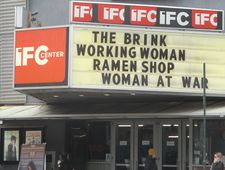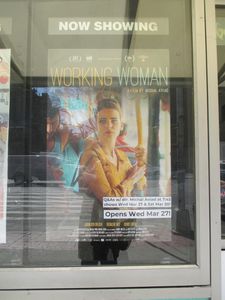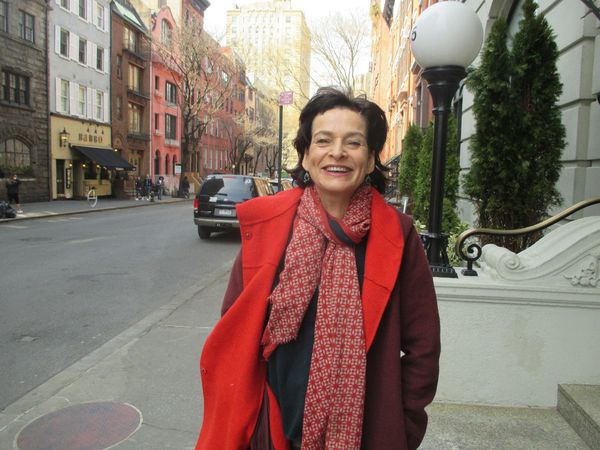Michal Aviad's Working Woman, co-written with Sharon Azulay Eyal and Michal Vinik, shot by Daniel Miller, stars Liron Ben-Shlush (Asaf Korman's Next to Her), Menashe Noy (Ronit Elkabetz and Shlomi Elkabetz' Gett: The Trial of Viviane Amsalem), and Oshri Cohen (Samuel Maoz' Lebanon, Joseph Cedar's Beaufort) with Irit Sheleg (Rama Burshtein's Fill The Void), and is produced by Amir Harel (Eytan Fox's Walk On Water which starred Lior Ashkenazi) and Ayelet Kait.
 |
| Michal Aviad on Liron Ben-Shlush as Orna in Working Woman: "I want to know how does it feel to be inside the female protagonist and try to look at it from her point of view." |
Orna (Ben-Shlush) appears to be happily married. Her husband Ofer (Cohen) who affectionately calls her Nunie is in the process of getting his restaurant off the ground and they have three young children, Yasmin (Yali Buskila), Inbal (Ruby Stern), and Tomer (Ido Silam). Orna has just had a meeting we do not see. She tells Ofer that she is hoping to be hired by the man who years ago used to be commanding officer at her Israeli military base. His name is Benny (Noy), a real estate developer whose next project is going to be his biggest.
Michal Aviad adeptly sets the tone of Working Woman by showing us the balancing act at home and at work that Orna tries to maintain when she is confronted by an increasingly demanding boss who oversteps into her personal space.
Anne-Katrin Titze: Hints of the harassment to come show up in the first scene of your film with the mention of "normal working hours."
Michal Aviad: It's so common today. Let's call it late capitalism, I don't know what to call it. Consumerist society, whatever you want to call it. My parents' generation, they were fighting for normal hours.
AKT: That doesn't exist anymore.
MA: And if you don't accept the no hours business, many times you just don't get a job.
 |
| Tomer (Ido Silam) with his father (Oshri Cohen) and mother (Liron Ben-Shlush) |
AKT: I think the fact that she is bringing this up to her husband, there is already the first kernel.
MA: The tension, yeah.
AKT: I like that you don't show the interview at all. It makes it very clear that we are with her throughout the film. We don't get Benny's point of view - that is, we do get it in the physicality how he is presented.
MA: Before writing and while writing and researching I looked for films that deal with sexual harassment. There aren't many. There are very few. The two notable ones are from the Nineties. They started to come after the Anita Hill case [in 1991]. The two are Fatal Attraction (1987) and Disclosure (1994). Strangely enough, it's the female boss who harasses her employee. And then the rest of them make sexual harassment romantic. And try to make the females who are harassed, like, extremely sexy.
I thought to myself, I want to know how does it feel to be inside the female protagonist and try to look at it from her point of view. Basically, we only have two points of view: one is her point of view, and the other one, let's call it the director's point of view, that is able to look at all of them. When we listen to testimonies and read them, what we don't see is exactly the proximity of bodies, the silences in-between words, the tension of expressions, of the way you hold your body. And I wanted to see and show it.
 |
| Orna (Liron Ben-Shlush) eyed by her boss Benny (Menashe Noy): "Every little detail of a relationship between women and men, when one is the superior - usually the man - has so much weight." |
AKT: During the 'Lily Beach' sequence, as I called it for myself, when Orna names the project, that is when the harassment really begins.
MA: That's right.
AKT: Right before that, Benny is taking her hand quickly to help her move around the construction site.
MA: The gentleman.
AKT: Right, that's fine, okay, no problem there. It begins with the hair. I expected him to give her a compliment about what is. Not what he would like her to be. Telling her how he presumes he would like her hair better is going too far.
MA: But you know, our sensitivities are … In day-to-day life, you heard millions of times men giving you 'compliments' and the same time demanding something. And you didn't even notice it. Because we are so used to it. So I tried as much as possible not to make him vulgar. To make him as tender as possible. But every little detail of a relationship between women and men, when one is the superior - usually the man - has so much weight.
I suppose she said to herself, "Yeah, probably I do look nice with my hair down." And she showed it to her husband and he says she looks nice, and she thinks "Well, great. I have my hair down, maybe we'll sell more." Also all this selling business. Women are required to be attractive in the selling business. And attractive is another word for sexy and tempting.
 |
| Michal Aviad on Orna (Liron Ben-Shlush) with Benny (Menashe Noy): "Women are required to be attractive in the selling business. And attractive is another word for sexy and tempting." |
But the moment something happens … And women do try to be attractive, sometimes they look horrible, you know, models and all these fantasies women have of what is sexy, which is similar to what men demand. And then when something happens, and somebody makes an advance at the woman, then of course she's a culprit. She was too tempting, she was too sexy.
AKT: "You drive me wild," is how Benny phrases it.
MA: Exactly.
AKT: And we know the wilderness is elsewhere. I liked how you structured that hair scene, because it moves from her hair to his. She has to go with him to get his hair cut.
MA: It's interesting what you're saying. You are the first one who is saying it.
AKT: Orna doesn't want to comment when he asks her "Do I need a haircut?" She signals "I'm not going there. I am not doing what you're doing." And right after that comes the skirt comment. He wants her to wear a skirt for the religious buyers. "You mean modest?" she asks. No, 'classy' is what he has in mind.
 |
| Orna (Liron Ben-Shlush) with Benny (Menashe Noy) and his wife (Dorit Lev-Ari): "Sexual harassment doesn't stay just with you, it's not just your doing. It's something that affects everybody." |
MA: 'Chic'. Nobody ever mentioned that scene. It's actually interesting, the barber scene. This idea of personal assistants - so often women are the personal assistants to males with power. And they just have to accompany them to do the most personal intimate things. "What do you think about my tie? Could you tie it better?" I had millions of scenes in my mind. The list of things that you can put there are just incredible.]
AKT: There are two interesting scenes with the mother. The first one has the mother asking her daughter "If he wants you to dress differently, does he give you extra money for that?" And then she is the one buying her the clothes. You establish their relationship this way.
Later on, one of the moments of the greatest loneliness in the entire film comes when the mother - and I don't want to give anything away, that's why I'm speaking a bit in code here - when the mother does not understand what happened in Paris. She cannot express it to her own mother, that's the isolation this kind of harassment produces.
MA: What I wanted to explore was how sexual harassment really destroys the entire context. How alone you are in your family, around your mates and the coworkers, in the entire field actually. Sexual harassment doesn't stay just with you, it's not just your doing. It's something that affects everybody.
 |
| Michal Aviad on Benny (Menashe Noy) with Orna (Liron Ben-Shlush): "In day-to-day life, you heard millions of times men giving you 'compliments' and the same time demanding something." |
Two nights ago, we had this Q&A and there was this older woman who burst out crying and said "We were these kind of mothers. Now it changed, but we were the mothers who made our daughters lower their heads and go on. We were the ones who were not protecting them." She cried and she cried and she said "Now the generation is changing. You mothers won't be like that."
AKT: It's great to get such a response.
MA: It was amazing. And the truth is, I do feel that mothers so often betray their daughters just because they feel that "I went through it, I'll teach you how to go through it." But they don't teach us how to rebel. In the worst cases, mothers are the ones who circumcise their daughters in Africa. "I went through it, I survived, now you go through it." It's a whole way of thinking of how mothers are there to maintain the system.
AKT: The actress [Irit Sheleg] who plays the mother was in Fill The Void, wasn't she?
MA: That's right.
AKT: I recognised some of the names. The actor [Oshri Cohen] who plays the husband, he worked with Joseph Cedar and Samuel Maoz.
 |
| Working Woman on the IFC Center marquee Photo: Anne-Katrin Titze |
MA: And actually Benny, Menashe Noy, was in Gett. He's a well-known actor. Liron herself, she was in Next To Her, which she wrote the script for and her husband [Asaf Korman] directed it. It's an excellent film. It was in Cannes in 2014.
AKT: What Orna in Working Woman is telling her husband, what she isn't telling him - you leave it up to the audience to figure out why. You give us all the different reasons that make it impossible for her to confide in him.
MA: I think so. Audiences have different interpretations. One is that if she would have told him, he wouldn't have allowed her to continue to work. One is that he would get jealous and go and beat up Benny.
AKT: The physicalness, the choreography of the encounter when it all escalates in Paris, is very hard to watch. You really wanted us to see the hand at the throat, where his hand goes.
MA: I'll tell you a little bit about it from two aspects. I myself was surprised, the idea was to do it in one shot. And then I timed it and it said 3 minutes. This is 3 minutes of her life and it's so significant for her life. 3 minutes! The other thing is, as director, I work with the actors by talking and talking and talking and becoming intimate and pouring out our hearts to each other. We developed the characters during those talks. And we decided that it's okay to have improvisations. There is only one exception. In all the sexual scenes, the two actors asked, and I thought it's a great idea, to really rehearse it step by step.
 |
| Working Woman poster at the IFC Center in New York Photo: Anne-Katrin Titze |
Now Menashe, who is Benny, said he came from totally different things. He said "I cannot stand it anymore. I go and there is a sexual scene and the director tells me, 'Okay and do it.' And I ask 'what do I do?' And the director goes, 'Whatever. Do you need a glass of wine or a joint? Just relax.'" And Menashe would say "I'm relaxed, I just don't know what to do." Which is very much an evidence to the fact that directors don't really want to deal with sex in the details of how different it can be. It can be about boredom, about anger. It can be about abuse.
AKT: But they don't want to give the choreography?
MA: Exactly. So what we did here was we really choreographed it, every little point of that, very carefully. And Liron, the actress, felt that because she knows the choreography so well, she can really focus on what she feels. And with the cinematographer Daniel Miller, he really choreographed all these very long takes. It was clear to us from the first moment that we're going to move very little, almost nothing, and allow this to happen. That's the way we did it.
Read Michal Aviad's remembrance with Anne-Katrin Titze of Agnès Varda.
Working Woman is in cinemas in the US.






















